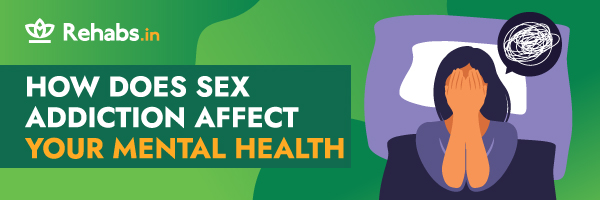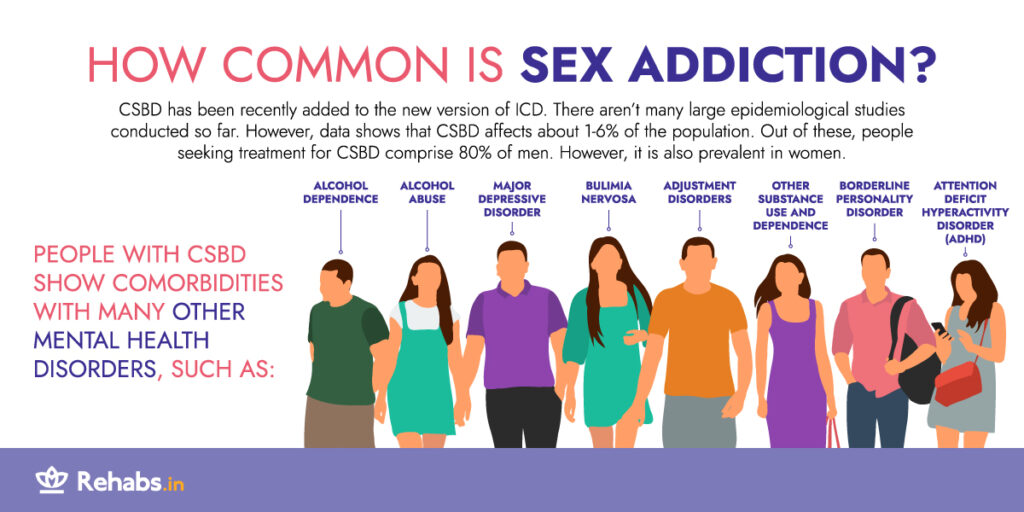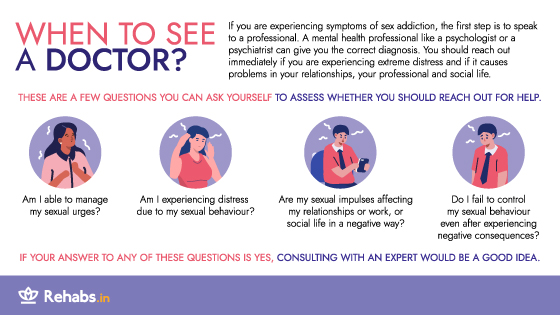How does sex addiction affect your mental health

Sex is one of the primary physiological needs in human beings, along with air, food and water. Sex addiction is a lack of control over sexual thoughts, impulses and urges. While these are very natural to most human beings, in some people, it might be in excess and affect the individual’s life negatively. The ICD-11(International Classification of Diseases) diagnoses this as Compulsive Sexual Behavior Disorder (CSBD).
Are porn addiction and sex addiction the same?
The use of pornography is one of the additional clinical features of CSBD. However, these terms may not mean the same thing. Porn addiction in itself, however, is not a separate diagnosis and comes under CSBD only. However, one can seek treatment regardless of what category they fall into.
A paper published in the journal World Psychiatry explores whether sex addiction is a real mental health disorder. They classify CSBD as an impulse control disorder. It is characterised by:
- Failure to control repetitive sexual urges
- Repetitive sexual behaviour
- Symptoms lasting for a long period of time (6 months or more)
- Leading to impairment in personal, social, and occupational life and overall distress

How common is sex addiction?
CSBD has been recently added to the new version of ICD. There aren’t many large epidemiological studies conducted so far. However, data shows that CSBD affects about 1-6% of the population. Out of these, people seeking treatment for CSBD comprise 80% of men. However, it is also prevalent in women.
People with CSBD show comorbidities with many other mental health disorders, such as:
- Alcohol dependence
- Alcohol Abuse
- Major Depressive Disorder
- Bulimia Nervosa
- Adjustment Disorders
- Other substance use and dependence
- Borderline Personality Disorder.
- Attention deficit hyperactivity disorder (ADHD)

When to see a doctor?
If you are experiencing symptoms of sex addiction, the first step is to speak to a professional. A mental health professional like a psychologist or a psychiatrist can give you the correct diagnosis. You should reach out immediately if you are experiencing extreme distress and if it causes problems in your relationships, your professional and social life.
These are a few questions you can ask yourself to assess whether you should reach out for help.
- Am I able to manage my sexual urges?
- Am I experiencing distress due to my sexual behaviour?
- Are my sexual impulses affecting my relationships or work, or social life in a negative way?
- Do I fail to control my sexual behaviour even after experiencing negative consequences?
If your answer to any of these questions is yes, consulting with an expert would be a good idea.
Can sex addiction be treated?
The short answer is Yes. Since the addition of CSBD under ICD-11, the diagnosis of the disorder has become easier. There are many different approaches to treatment. A professional can help you decide the best program for you.
Residential programs like rehab
Many rehabs in India offer treatment for sex addiction. Treatment in rehab can take you away from your usual environmental setting. This gives you a new space just to focus on your recovery. These programs would often involve regular individual and group therapy, pharmaceutical treatment if necessary and other holistic treatment modalities. The treatment programs may differ from one rehab to the other and are often individualized according to your needs.
Many support groups run both online and offline. These may often follow the same principles as Alcoholics Anonymous (AA). Programs like Sex Addicts Anonymous (SAA) provide a space for you to connect with others experiencing the same things as you.
Unlike AA, however, members aren’t expected to give up sex entirely. But you might be encouraged to refrain from engaging in compulsive behaviours. These group meetings can help you learn ways to cope with your problems.
Cognitive Behavioral Therapy (CBT)
CBT is a type of therapy used in both individual and group settings. CBT sessions are conducted by a licensed Psychologist. This therapy helps people identify their urges, beliefs and thoughts that lead to unhealthy behaviours. They are then taught to alter these thoughts and beliefs to engage in more healthy behaviours.
Psychopharmacological treatment
Medicinal treatment for CSBD can help assist the treatment program. The drugs that are often proscribed for CSBD include:
- Antidepressants
- Naltrexone
- Mood stabilizers
- Anti-androgens.
How does sex addiction affect mental health?
Sex addiction comes with severe emotional, mental and physiological problems. These symptoms can cause extreme distress to a person. Getting treatment for CSBD becomes necessary because it might put you at risk of developing other mental health problems.
Sex addiction also comes with a lot of stigma around it. This stigma may often add to the stress of people experiencing it. CSBD also shows a strong link with substance abuse and other behavioural addictions. It is possible that untreated CSBD will perpetuate symptoms of other comorbid disorders.
CSBD also has a high comorbidity with depression and other mood disorders. People with CSBD might feel socially isolated and have problems in their personal relationships as well. This distressing experience can make it harder to enjoy other things in life.
Other problems related to sex addiction
People with CSBD are at a higher risk for sexually transmitted infections (STIs). They may also show a lack of hygiene maintenance. Preoccupation with sex can make them disinterested in all other activities like working or spending time with friends. The symptoms are likely to worsen over time.
Engaging in sexual behaviours is also not rewarding and rather brings in more distress, feeling of shame, and lack of control. It can get difficult to maintain their focus on anything. People with CSBD might also exhibit a low-self esteem. It may have started as a coping mechanism, but it eventually worsens the situation.
They are also at risk of getting into legal trouble. If people with CSBD also abuse other substances, recovery may be complicated. Relapse is more likely in people with multiple disorders.
Sex addiction comes with emotional, financial, legal, occupational and family consequences and overall distress in life. Paying attention to these symptoms and getting the necessary treatment is extremely important. If you or someone you know is suffering from symptoms of sex addiction, know that help is available. You can browse our list of mental health and addiction treatment centres here.
Sources:
Antons, S., Engel, J., Briken, P., Krüger, T., Brand, M., & Stark, R. (2022). Treatments and interventions for compulsive sexual behavior disorder with a focus on problematic pornography use: A preregistered systematic review. Journal of Behavioral Addictions, 11(3), 643–666. https://doi.org/10.1556/2006.2022.00061
Ballester-Arnal, R., Castro-Calvo, J., Giménez-García, C., Gil-Juliá, B., & Gil-Llario, M. D. (2020). Psychiatric comorbidity in compulsive sexual behavior disorder (CSBD). Addictive Behaviors, 107, 106384. https://doi.org/10.1016/j.addbeh.2020.106384
Castro-Calvo, J., Gil-Llario, M. D., Giménez-García, C., Gil-Juliá, B., & Ballester-Arnal, R. (2020). Occurrence and clinical characteristics of Compulsive Sexual Behavior Disorder (CSBD): A cluster analysis in two independent community samples. Journal of Behavioral Addictions, 9(2), 446–468. https://doi.org/10.1556/2006.2020.00025
ICD-11 for Mortality and Morbidity Statistics. (n.d.). https://icd.who.int/browse11/l-m/en
Kraus, S. W., Krueger, R. B., Briken, P., First, M. B., Stein, D. J., Kaplan, M. S., Voon, V., Abdo, C. H. N., Grant, J. E., Atalla, E., & Reed, G. M. (2018). Compulsive sexual behaviour disorder in the ICD-11. World Psychiatry, 17(1), 109–110. https://doi.org/10.1002/wps.20499
Phillips, B., Hajela, R., & Hilton Jr, D. L. (2015). Sex addiction as a disease: Evidence for assessment, diagnosis, and response to critics. Sexual Addiction & Compulsivity, 22(2), 167-192.














